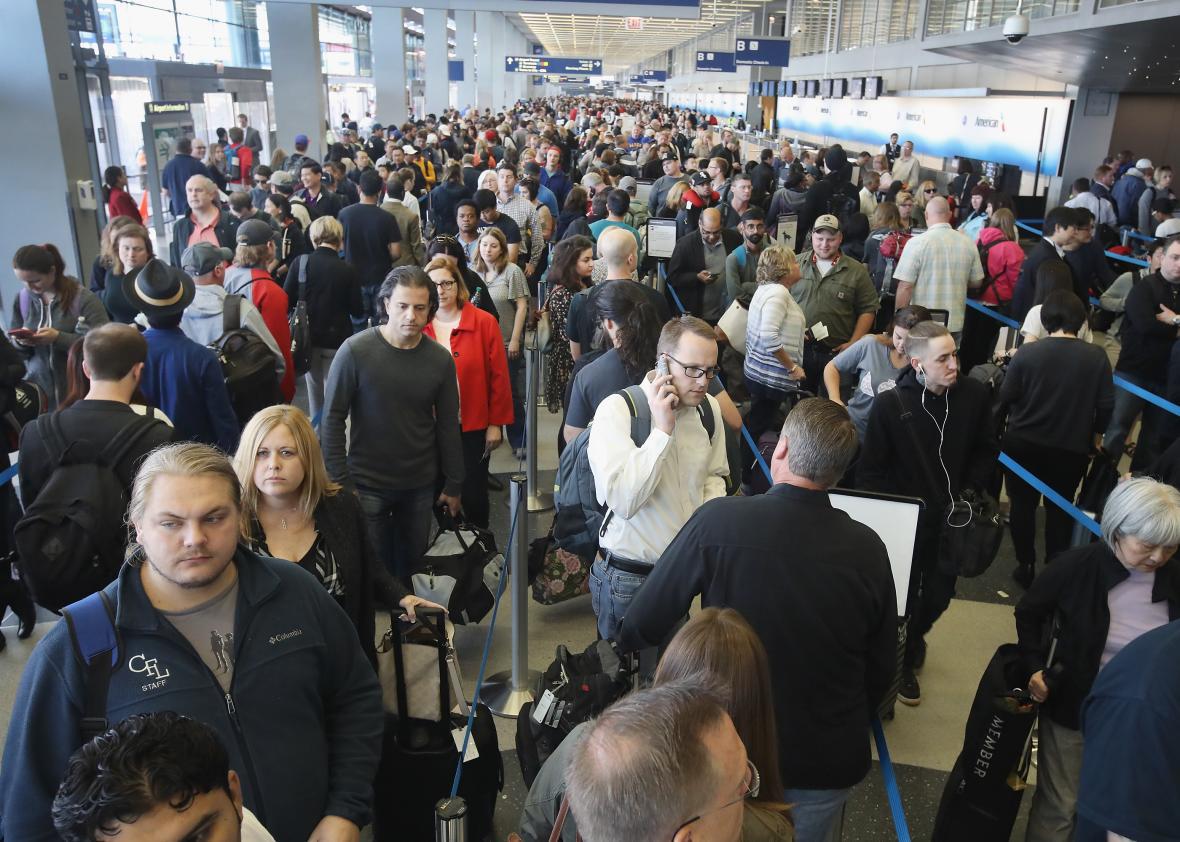United Airlines and Wells Fargo were on the front page of the New York Times on Tuesday, in two very different stories with a familiar theme: consumer-facing companies behaving badly.
The board of Wells Fargo has voted to force two former executives to return $75 million in pay and stock, the latest consequence of the fake-account scandal that netted the company $185 million in fines last summer. United is in hot water, as you’ve probably heard, for asking the Chicago Police Department to drag a 69-year-old doctor off a flight after the airline’s $800 rebooking incentive went untaken.
What do 1.5 million fake bank accounts and one manhandled doctor have in common? Americans’ perception that the companies they deal with every day are increasingly unaccountable.
We have not all been dragged bloody up the aisle of an airplane by the Chicago PD, of course, but there was something familiar in David Dao’s bruising at O’Hare—his limp and futile act of resistance a metaphor for the lack of agency we all feel when flying. Or that we feel elsewhere in our interactions with corporations.
My former colleague Helaine Olen made an astute series of observations (now fleshed out in a New York Times opinion piece) about the connection between middle-class political anger and the petty hassles of customer service:
One way that corporate unaccountability is reinforced is through the rise of arbitration. Language in virtually every contract you sign for a bank, cellphone, or concert ticket prevents you from joining a class-action lawsuit or even class-action arbitration; for all but the most egregious corporate misdeeds, an individual lawsuit isn’t worth it. Wells Fargo is a classic case: It has used an arbitration clause to force customers to battle with the bank one-on-one, if at all.
As the Times reported in December, “In many instances, the fees that customers were charged on the unauthorized accounts were less than $100. Few lawyers will take up individual arbitration claims when the potential damages are low.”
At the same time, a wave of mergers and consolidations in some industries have left American consumers with fewer options than before. United is a classic case: airline consolidation has left 80 percent of domestic passenger traffic in the hands of the four largest U.S. companies.
As I wrote in October, after ProPublica released its investigation of the fallout from the American Airlines–U.S. Airways merger, the problem is general:
Globally, 2015 was the busiest year on record for mergers. The trend has been especially pronounced in the U.S. As the Economist reported last month, the share of GDP generated by the 100 biggest U.S. companies is up from 33 percent in 1994 to 46 percent in 2013. The number of listed U.S. companies fell by half between 1997 and 2013. Two companies control more than half of all U.S. sales in beer and in music. Three companies control 99 percent of the pharmacy business. Following this year’s merger of Charter, Time Warner, and Bright House, two companies control between 70 and 90 percent of the U.S. broadband industry.
You will not be surprised to learn that in the most recent report prepared by the American Customer Satisfaction Index, television and internet providers are the least-liked private industries Americans deal with, and it’s not even close. Rounding out the bottom six? Health insurance (yes, there’s a clear health care angle in consumer protection), cellphones, landlines, and … airlines.
That suggests a corollary to Olen’s observation, which is that Democratic politicians should start talking about consumer protection in ways that go beyond Wall Street. (Banks have oddly high ratings in the ASCI, perhaps because banking services are pretty good unless you’re poor, whereas health insurance is a hassle for virtually everyone.)
Some of those pols clearly already understand voters’ keen interest in stopping consumer exploitation, including Sens. Elizabeth Warren, Sherrod Brown, and Al Franken. Warren, of course, proposed and established the Consumer Financial Protection Bureau—which issued its largest-ever fine, of $100 million, to Wells Fargo. Its oversight, however, is limited to financial products.
Brown has been one of the leading Democrats fighting against forced arbitration, joining Franken to co-sponsor the Arbitration Fairness Act, which would undo some of the damage from the Supreme Court’s 2011 decision that pre-empted state protections for customers. Needless to say that measure has little support from Republicans who have long decried excessive litigation. (For more on how arbitration has wound its way into your contracts, read the Times’ full investigation from 2015.)
Franken, for his part, has become one of the Senate’s highest-profile defenders of net neutrality and internet privacy. When the Republican-led Congress voted last month to repeal FCC rules that would have prevented internet service providers from selling user data, Franken was forthright in his condemnation: “This is purely and simply a corporate handout at the expense of individual privacy,” he said. “This really opens up for anything they want to do with your information. No limits.”
Trump signed that law last week, and it passed the GOP Congress easily. But according to a Huffington Post/YouGov poll, only 6 percent of Americans think ISPs like Verizon should be allowed to share your data without permission. That is a gap that Democrats should exploit.
It’s not that these ideas weren’t part of the Democratic platform last year, but they didn’t catch on. This was partly because of Hillary Clinton’s own unforced errors discussing her relationship with the financial sector. (Asked about her relationship to Wall Street, she invoked 9/11.) And partly because she was charged with simultaneously running on and against Obama’s record, which was mixed. (Warren, for example, said Obama’s antitrust legacy was lacking.)
Democrats searching for a theme to bridge the perceived gap between the party’s two wings have one right in front of them. It’s helping Americans hold their ground against the companies they like least: airlines, health insurance, phone companies, cable and satellite TV, and internet providers.
